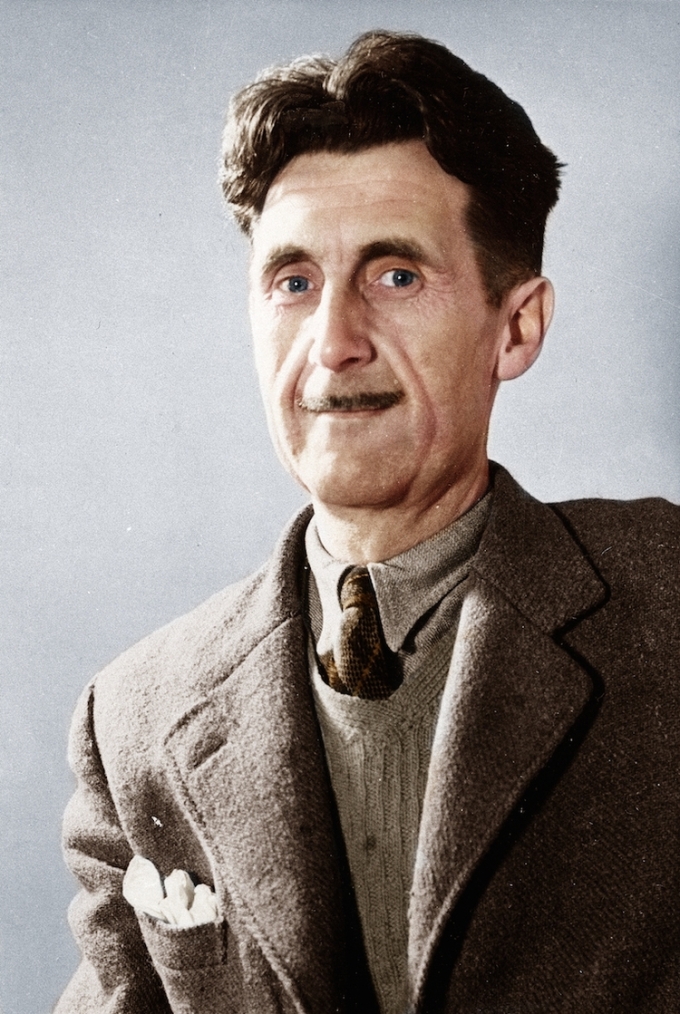Why I Write

Author: George Orwell
Published: Penguin Books, 2005 (120 pages)
Started reading: 27.November.2016
Finished reading: 30.November.2016
Brief description
George Orwell is most famous for the books Animal Farm and 1984. Yet many of his essays are also political and literary works of lasting repute.
Why I Write is a small, enjoyable Penguin compilation of four of these essays.

Eric Blair, pen name George Orwell
Why I Write (1946)
Orwell writes about what propels him as a writer. He lists four, usually concurrent, motives for authors: sheer egoism, aesthetic enthusiasm, historical impulse and political purpose.
“Every line of serious work that I have written since 1936 has been written directly or indirectly against totalitarianism and for Democratic Socialism as I understand it.”
He reflects that his writing has been at its worst when it lacked purpose, and that his purpose since the outbreak of the Spanish Civil War has been Socialism.
The Lion and the Unicorn (1940) – written as German bombs were falling over London.
Orwell believed the answer to winning WWII was to embrace Socialism. Mere weeks before war broke out, English capitalists were rushing to make a profit by selling rubber, metals and other goods to Germany. Meanwhile, the English military was at the same level of preparedness as in 1918.
A country with its interests divided by capitalism, Orwell argued, was incapable of beating a united fascist state. His answer: at home they should nationalise industry and infrastructure, allow the wealthiest person to be paid only ten times as much as the poorest, and democratise education. Morale and money could then fully be channelled into the war effort.
“We cannot win the war without introducing Socialism, nor establish Socialism without winning the war.”
Obviously not factoring in the negative/positive black swan of Pearl Harbour, which brought the US into the war (and the other black swan of Hitler committing Napoleon’s error of opening up two fronts by turning on Russia), Orwell thought a revolution was essential to English victory.
If his predictions for a Socialist revolution never came to fruition, his descriptions of English character and wartime England are charming (and accurate). He captures in one phrase the English people, from the working class to the complacent elite: “A family with the wrong members in control”.
For Orwell, a deep and abiding patriotism in the working and middle classes offset the aristocracy’s incompetence. When Anthony Eden appealed over the radio for Local Defence Volunteers, a quarter of a million men signed up in the first twenty-four hours, and another million over the next month.
In terms of the national mood, Orwell’s description of England as the world’s “shock absorber” conveys the existential fear, mingled with defiance, they must all have felt during the years between Dunkirk and Pearl Harbour, with their tiny isle (well, give or take an empire spanning a quarter of the earth’s surface) set against the Nazi war machine.
“For a long time, a year, two years, possibly three years, England has got to be the shock absorber of the world.”
A Hanging (1931)
In this essay, Orwell, a staunch opponent of the death penalty, narrates an execution he witnessed in the subcontinent. A man, handcuffed, is lead to be hanged, while Orwell observes, jarringly, a dog that bounds up to the execution party and, moments later, the prisoner stepping to avoid a puddle, 40 feet from the gallows.
“It is curious, but till that moment I had never realised what it means to destroy a healthy, conscious man.”
Politics and the English Language (1946)
Orwell exposes five examples of bad prose, and lists his rules for good writing, as well as explaining the link between bad writing and politics. Funnily enough, he rules against using foreign expressions, such as mutatis mutandis and status quo – two latin phrases he used six years earlier in The Lion and the Unicorn. But, before I get too cocky, in truth this is more a reflection of Orwell’s honesty and openness to change. As Hitchens wrote in Orwell’s Victory, “In answer to the accusation of inconsistency, Orwell as a writer was forever taking his own temperature.”
Orwell reminds us to use short, clear, concrete words, to avoid the not un- construction, which tries to mask banality as profundity, and to not mix metaphors, as in “The Fascist Octopus has sung its swan song” or “The jackboot is thrown into the melting pot”.
The more language is debased with imprecision, the more euphemisms politics has to spin terrible lies.
“I am going to translate a passage of good English into modern English of the worst sort. Here is a well-known verse from Ecclesiastes:
‘I returned, and saw under the sun, that the race is not to the swift, nor the battle to the strong, neither yet bread to the wise, nor yet riches to men of understanding, nor yet favour to men of skill; but time and chance happeneth to them all.’
Here it is in modern English:
‘Objective consideration of contemporary phenomena compels the conclusion that success or failure in competitive activities exhibits no tendency to be commensurate with innate capacity, but that a considerable element of the unpredictable must invariably be taken into account.’
Actionable insights
> If you want to write well, have something to say. It seems to me many people (at least in movies and cultural consciousness) decide they want to ‘be a writer’ before they actually have anything to write about. Good writing should be the irrepressible outpouring of value to the world, not mere words for the author’s benefit. A writer like Nassim Taleb, for instance, built up a lifetime’s worth of observations, skills and readings before letting it all out in his Incerto series. Live, learn first, author later.
> Develop a writing habit of never using a metaphor, similie or other figure of speech which you are used to seeing in print. Remember, cliches should be avoided like the plague!